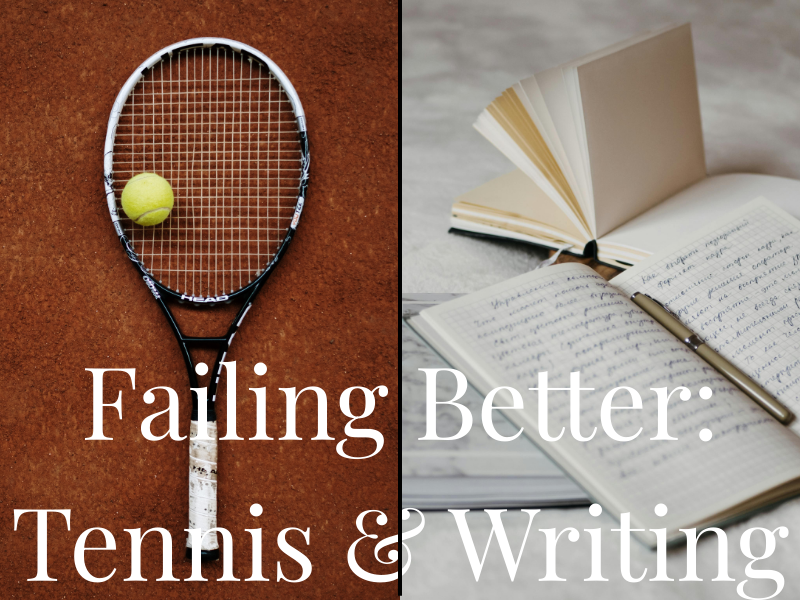When I stumbled across Thomas Swick’s recent essay on Lithub, Failing Better: On the Tennis Player and the Writer, I was immediately intrigued. The title alone promised a comparison I’ve often felt but never quite put into words: how the disciplines of tennis and writing mirror each other. The piece braided two of my favorite pursuits into a meditation on concentration, failure, and persistence. I couldn’t resist reading—and now, I can’t resist sharing.
Watching this year’s U.S. Open while thinking about my own games on Rochester courts, I see how the rhythms of tennis echo the rhythms of writing. Both require intense focus, anticipation, and a willingness to improvise. Both are shaped by creativity as much as by discipline. And both, frankly, can feel like exercises in futility.
Swick confessed to fretting over his backhand when he “should” have been developing his voice. I may resemble that remark. This summer, with so many glorious days, I often found myself on the court instead of at my desk. But here’s the thing: tennis and writing both teach me to keep going.
Learning to Love the Whiff
When I picked up tennis at 40, I was awful. I whiffed. I hit the net. I hit myself. I lost more games than I care to count. Still, I kept showing up because I wanted something more exciting than walking on a treadmill. I wanted to see what might happen if I tried.
A coach once told me something that stuck: everyone sucks at the beginning, because you don’t know anything at first. Take it one ball at a time. In other words, don’t expect brilliance. Expect mistakes. Let the failures teach you. So I practiced. I played with better players. Slowly, I improved.
Writing has been the same. I sit at my desk, wrestling with sentences that refuse to cooperate. I write 1,000 words only to delete half. I question my ability to tell a story that anyone would want to read. Sometimes I feel like quitting because it’s just too hard. But then I remember the patience I learned on the court—one ball at a time, one word at a time.
Technology, Tools, and the Human Factor
Technology has advanced both games. Tennis players now swing graphite rackets strung with high-tech strings that give them power and spin. Writers now have computers, editing software, and even generative AI to help brainstorm or polish drafts. These innovations have changed the way we play, the way we write.
But no tool can replace the human element—the messy, frustrating, exhilarating process of showing up and trying. A new racket can’t promise a perfect serve, and even the latest AI novelty can’t guarantee a flawless paragraph. What matters is what we bring to the game: concentration, creativity, resilience.
The Satisfaction of Small Wins
Winning at tennis is exhilarating, even when it’s not the U.S. Open and there’s no prize money or fame. A cleanly struck backhand. A rally that goes ten shots. A set finally taken off a stronger opponent. Each small victory carries its own satisfaction.
Writing has its version of those wins. Completing a draft. Finding a sentence that finally sings. Sending a piece out into the world. Those moments carry me through the inevitable failures.
And there are many setbacks—missed deadlines, rejections, creative dry spells. But just like in tennis, one small “yes” can outweigh a season of no’s. Even when I feel depleted, I look around my office—at the notebooks, Post-its, scribbled wall notes—and see proof that the spark hasn’t gone out.
Beckett’s Wisdom
Swick closes his essay with the great Irish tennis fan Samuel Beckett, who wrote: “Ever tried. Ever failed. No matter. Try again. Fail again. Fail better.”
Those words apply equally to the court and the page. I know them in my body every time I double-fault. I know them in my heart every time I receive a rejection letter. And I know them in my bones when I return anyway—racket in hand, pen in hand, ready to try again.
The Long Game
Tennis and writing are both lifelong pursuits. They require patience, perseverance, and the ability to fail better over time. Neither guarantees perfection, but both bring me joy.
So I’ll keep swinging. On the page. On the court. Because in both, the joy comes not from perfection but from showing up, failing better, and playing the long game.


 The monster inside
The monster inside
